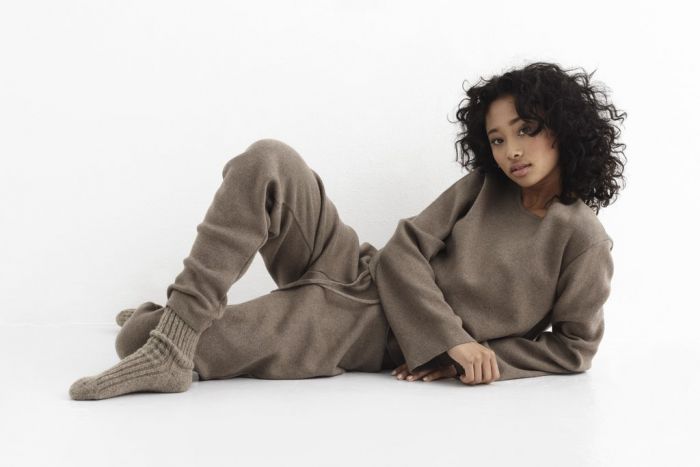Mamoq is an innovative shopping platform bringing a curated collection of fashion to the conscious consumer. By showcasing brands that strictly match a select quality criteria, Mamoq's motif is to encourage positive change within the fashion industry. Following a shift in the fashion system which now defines a more curious consumer looking for more value in each purchase, Mamoq's philosophy can be summed up in these 5 keywords: Meaning, Accountability, Materials, Opportunity and Quality, signifying longevity and purpose in fashion. We spoke to Madeline Petrow, founder of Mamoq platform, for an inside perspective on how conscious shopping online has been made easier than ever before.
Words: Hanna-Amanda Pant
Image: Madeline Petrow, Founder of Mamoq
How did the unique Mamoq platform start out?
We created Mamoq to provide a thoughtful alternative to mainstream fashion. The ease and accessibly with which we can buy cheap fashion has made it easy to buy something new, wear it once, throw it out and never think about it again. This is hugely unsustainable, especially considering how harmful the fashion industry can be to both our planet, and those who make our clothing. We launched Mamoq in efforts to combat trends of excessive consumerism, and encourage people to shop from brands that challenge the status quo of the fashion industry. This is, through their commitment to sustainable and ethical production.
Why are the 'shopping philosophy' principles you have curated throughout your website, e.g. referring to making meaningful purchases and quality investments, perhaps relevant in this day and age to combat mindless consumption?
It’s really important to question the things we buy in order to better understand the impacts that they have, both negative and positive. Mamoq is actually an acronym for MEANING, ACCOUNTABILTY, MATERIALS, OPPORTUNITY and QUALITY, representing a few key points that we like to consider before buying something new. For instance, questions 'Is the brand accountable for their production? Are the materials sustainable? Am I choosing something that is quality and will last for years to come?', are vital in this day and age. This engaging, question-led shopping philosophy is a great way to combat mindless consumption, and make purchases we can feel proud of.
Image: Mayamiko Grace Open Back Top / Mamoq.com
Would you say it continues to be a difficult mission to encourage positive change within the global fashion industry?
Unfortunately, yes. As a whole, the fashion industry is unlikely to change their production practices unless consumers demand it. We can do this by voting with our wallets and boycotting brands that continue to produce irresponsibly, while instead choosing to buy from brands doing it the right away.
What do you think about the current consumerist trends towards which the fashion industry is inclined to? Have you witnessed a sharp shift in consumerist behaviours lately?
Over the past decade, we have definitely witnessed a rise in cheap, fast fashion. Instead of releasing one or two collections a year, high street shops are releasing new collections all year round. This increases our tendency to buy more because it’s affordable to always have the ‘latest it-look’. However, in the past couple years, we have seen a backlash from this, with the rise of the ‘slow fashion’ movement which embraces season-less, high quality designs. It is really exciting to see the pendulum start to swing back in the other direction.
You only work with fashion brands that have some relevance to the valued slow, artisanal approach. How do you choose the brands to work with and represent on Mamoq? Has there been more of a dialogue going on with the brands in terms of mission and expectations?
We only partner with brands that actively commit to creating positive change within the fashion industry. Additionally, we evaluate each brand against the 12 Mamoq Values that encompass a variety of social and environmental criteria, including ‘Handmade’, ‘Made In Europe’, ‘Vegan’, ‘Eco-conscious’, ‘Charitable Give Back’ and more. Each brand must share our overall goals and mission to create a positive impact within the industry, and meet a minimum of three specific Mamoq Values.
"When shopping in a store, sometimes it is hard to really learn about the mission and ethos of the brands on offer. Whereas online, we are able to share an incredible amount of information and insight about each product and brand that we partner with."
Image: SHARE THIS Rhumaa Urban Top / Mamoq.com
What are some of the most innovative new brands you are currently collaborating with? Why do you feel their social mission might be relevant to encouraging change within the fashion industry?
Personally, I find brands focusing on circular production particularly promising agents of change within the fashion industry. The idea of circular production essentially challenges linear production model of 'take, make, dispose'. Instead of taking natural resources, making something new, and then throwing it away, circular production promotes the use of recycled materials that can be recycled once again after use. Elvis & Kresse are really pioneers in this model and they are currently working on an innovative design system that weaves together leftover leather scraps from luxury brands. With their system, the idea is that each piece can be deconstructed and constructed again into something new. Prolonging the use, longevity and functionality of our natural resources is a really exciting way to help encourage real and lasting change within the fashion industry.
As shopping as an activity takes up such a big part of our leisure time, encouraging consumers to shop more consciously sometimes does feel like fighting windmills. In your opinion, why should we put a slower approach in the spotlight in 2018?
Just because something is hard to change doesn’t mean we just give up trying to change it. We need to be conscious of our fashion consumption, we need to conscious of our energy consumption, our plastic consumption, our meat consumption. It doesn’t mean giving everything up and living a zero waste, no impact life. It means thinking about our habits, understanding their impacts, and making daily choices that we can feel good about.
As you have chosen to opt for only the web store concept, does this model bring any restrictions to your business, e.g. compared to having a boutique set up with select brands only?
We chose to focus on an online marketplace because it gives us the space and ability to really tell the story behind each brand. When shopping in a store, sometimes it is hard to really learn about the mission and ethos of the brands on offer. Whereas online, we are able to share an incredible amount of information and insight about each product and brand that we partner with. Of course, brick-and-mortar stores have some great advantages, so that is why we are planning some really exciting pop ups in London this year.
"Companies shouldn’t be celebrating the fact that they don’t use slave labour. This is not a victory, this is a bare minimum."
Image: Flock by Nature Eloise Merino Wool Jumper / Mamoq.com
What are some of the positive changes you would like to witness to take over fashion industry in the near future?
I think that ethical production should be the norm, not something to be praised. Companies shouldn’t be celebrating the fact that they don’t use slave labour. This is not a victory, this is a bare minimum. I would love to see collective action that demands more from the brands we support.
What's your take on fashion weeks and 'seasons' in the current fashion system, the fact that high street retailers can accommodate (up to) 52 seasons per year and consumers have no choice left but to keep up?
We do have a choice. Fashion is a way to express your individuality and personality. Stop chasing the ‘it-trends’, find your style, buy to last, and wear it proudly.
Instagram @think_mamoq
Twitter @think_mamoq



